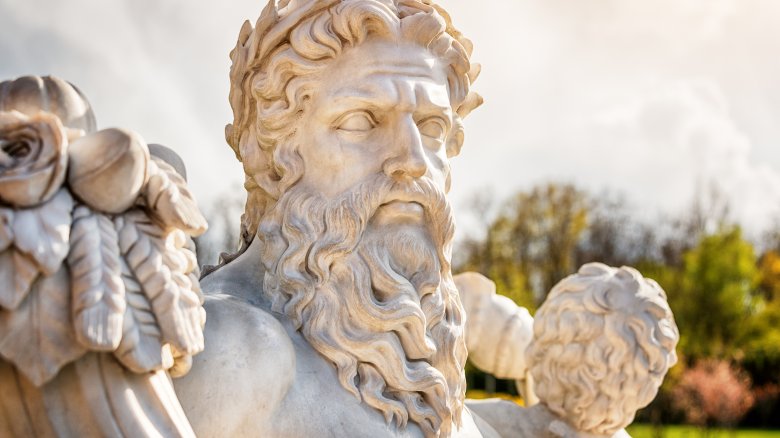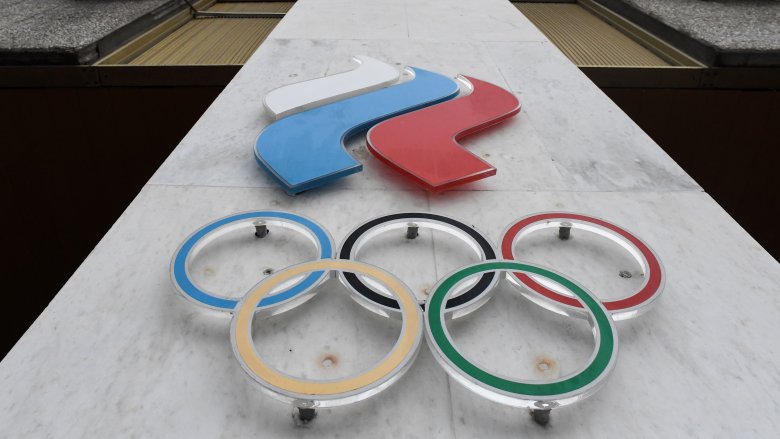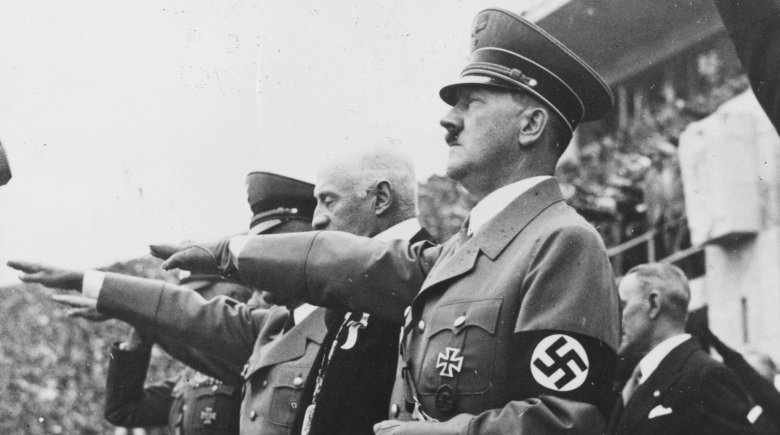False Things You've Always Believed About The Olympics
The tragic reality is that somewhere in the world, there's always a war going on. Luckily, there's also one bastion of hope glowing bright in the darkness: the Olympic games, that monumental event where all the nations of Earth put down their swords and come together for a big party of jumping, running, and throwing things. The games are cheered on from every corner of the globe. But every popular tradition gets bogged down in a bunch of silly myths and bizarre falsehoods, and even the great Olympic games are no exception.
That gold medals are made of pure gold
When it comes down to it, gold is nothing but a rare metal with a weird yellow tint. But humans are weird, so we treat the stuff with the same obsession Gollum has for his little (gold) ring. Whether you're stocking your basement with gold bars, getting fillings, or buying gold jewelry, the yellow stuff will empty your wallet like a vacuum cleaner. That's why the strenuous, stubborn, back-breaking efforts of Olympic competitors are rewarded with a fancy gold medal. They've earned it, after all.
Except, um ... the medal that athletes strive for isn't made of pure gold, according to CNN. It turns out the most famous award in the world just has a gold wrapper, like an overpriced Reese's Peanut Butter Cup. Six grams of gold is all that's needed to give the medal its trademark appearance, while the inside is filled with 93 percent silver and 6 percent copper. It's a lot more cost-effective. But listen, before you go ranting about the good old days, when "gold was really gold," you should know that the Olympics have been handing out these gold-wrapped medals since 1912, so it's hardly a new thing.
That any city would be honored to host the Olympics
On paper, the privilege of hosting the Olympics is one of the greatest honors any metropolis could hope for. It's an opportunity for a city to propel itself onto the world stage, to become a part of history, for millions of visitors and TV viewers to become familiar with all its greatest landmarks. Sounds awesome, right?
Wrong. Hosting the Olympics is a raw deal that often cripples a city with severe debt. The costs are high, the economic benefits are suspect, and the tax bill at the end is nothing to scoff at, leaving citizens furious. Besides that, can you imagine the traffic delays? Yuck. For example, take Boston. As described by Boston.com, when the New England city was moments away from clinching the deal to host the 2024 Olympics, Massachusetts residents — still feeling understandably sore from the infamous "Big Dig" project — raised such a ruckus that the whole thing got canceled, sending the 2024 games off to Paris.
The Bostonians had good reason to be concerned; just look at what the Olympics has done to other cities. Perhaps the most ominous warning signal went off in the city of Rio de Janeiro, Brazil. According to the Independent, Brazil's economy fell apart after Rio hosted in 2016, likely exacerbated by the Olympics. Maybe that's why, according to the Washington Post, the number of cities interested in hosting the games has been steadily spiraling downward.
That competitors have always been professional athletes
At their core, the Olympic games spring from a utopian dream, where all of Earth's nations rally together for some good ol' sportsmanship. However, the contemporary Olympics are painted in all the ugliest colors of capitalism: giant logos everywhere, constant advertisements, and more. It's assumed that Olympic competitors are all professional athletes, decorated with logos and corporate trademarks.
Well, the reverse used to be true, according to CNN. Until the mid-20th century, it was practically a commandment from Zeus that Olympians were not, under any circumstances, allowed to be professionals. They had to be "amateurs" who earned no money for their amazing feats. Basically, the idea was to make sure the games didn't get bogged down in money-grabbing greediness, and thus stayed true to their original ideals.
This rule was so strictly enforced that the world-famous Olympic competitor Jim Thorpe, pictured above, was actually stripped of his gold medals when news leaked that he'd once accepted a little cash for playing semi-pro baseball. The so-called "amateurs code" only changed with the advent of television, when advertisers giggled uncontrollably at the lucrative viewership numbers they could reach if the games allowed everyone's favorite professional athletes to compete.
That the Olympics have been happening since Ancient Greece
It's pretty amazing to think that we still celebrate an ancient Greek tradition, isn't it? Maybe that's why it's so tempting to believe that the Olympics have always been around, uniting the world through every calamity, from the Dark Ages to the atom bomb. However, History points out that the last time the Ancient Greeks threw together their big Olympics shindig was probably around 393 A.D., after which they called it quits. As the centuries went on, people got nostalgic about the good old days before their great-grandmothers were born, and according to Business Insider, the tradition had a low-key revival in 1612, when a national "Olimpick" games took place in Chipping Campden, England.
This was followed by other national games in England, but the true beginning of the international Olympics that we celebrate today happened on April 6, 1896. That year, the games were held in (you guessed it) Athens, Greece, and 14 nations competed, including the United States, France, and Germany. Since then, the Olympics have been going strong, other than the occasional interruption due to wars and whatever.
That the Olympics has always been about sports
If you hopped aboard a time machine back to ancient Greece, and waltzed your way into the original Olympic games, you'd find yourself in a wild party that resembled an immense woodland festival far more than the Olympics of today. According to National Geographic, the Olympics gathered crowds of about 40,000 people with no proper seats, and the festivities included palm readers, fire eaters, artists, writers, ladies of the night, and plenty of ritualistic sacrifices to the gods. Oh yeah, there were sporting events, too. But none of the athletes wore clothes, and their skin was coated in olive oil.
In a Time interview with Tony Perrottet, author of The Naked Olympics, Perrottet described the ancient games as being, "like an extremely badly-planned rock concert, the Woodstock of antiquity." However, none of these festivities were frivolous. The Olympics were, first and foremost, a religious event, held in honor of the god Zeus. Even when athletes did compete, as described by David Romano, a professor of Greek archaeology, they did so in order to please one of the gods or goddesses. So yeah, sports were certainly peppered in among the other wild Olympic activities, but they weren't the main event.
That each Olympic ring stands for a certain continent
The Olympic rings are one heck of a potent symbol. Just like Superman's S-shield or the valentine-shaped "heart" that looks nothing like a heart, you'd be hard-pressed to find someone who doesn't recognize those rings. The (slightly-racist-in-parts) legend is that each ring stands for a certain continent: While the red ring supposedly symbolizes both North and South America, the black ring stands for Africa, the yellow ring is Asia, the blue ring is Europe, and the green ring is Oceania. Antarctica gets skipped, of course, because penguins aren't allowed to compete.
There's a degree of truth to this idea, but most people totally misinterpret it. As explained by Reader's Digest, the logo was designed in the early 1900s by a French aristocrat named Pierre de Coubertin. Now, pay attention. While the five rings do represent the five "continents," no specific ring stands for any specific continent. The colors (red, black, yellow, blue, and green, in case you forgot) were chosen because at least one of these colors could be found in every national flag in the world at the time. To sum it all up, the Olympic rings are all about worldwide inclusiveness, harmony, and peace.
That Olympic judges are always fair and unbiased
Yes, Olympic judges should be totally unbiased in their assessments, and sure, we'd hope that every judgment they make is fair and accurate. Sadly, reality doesn't always live up to these ideals, and there have been a number of messy scandals. One particularly suspicious example happened during boxing at the 2016 Rio Olympics, when the perception of corruption became so widespread that all 36 boxing judges and referees were suspended, according to the Washington Post. Some argue that judge bias starts messing things up even before the actual Olympics have gotten underway. In 2018, NPR published a piece examining unfairness in the selection process for Olympic figure skating competitors, with sports writer Christine Brennan arguing that some skaters were arbitrarily held to higher standards than others, with a clear bias toward younger skaters.
It gets even weirder because some of the accepted processes involving the judges are totally bizarre. For example, take the odd-looking way Olympic gymnastics teams hand over $100 bills to the judges. This is part of the "inquiry" process (basically challenging the score they received), but the fee doesn't go to the judges. The challenger gets the money back if there was indeed a problem with their score, but they lose the money if the judges confirm their decision, according to SB Nation. Like losing a timeout in the NFL or NHL, but a little closer to home.
That the famous torch relay is an ancient Olympic tradition
Some people don't like to discuss this, and it's easy to understand why. After all, the Olympic torch relay is something folks really enjoy, and it's hard to imagine a more epic way to launch the festivities. The problem is that people think it's an ancient Greek tradition, but as USA Today points out, it was actually invented by the Nazis.
Germany hosted the Olympics in 1936, and Adolf Hitler decided to use it as one big Nazi propaganda tool. The torch relay concept, invented by German sports administrator Carl Diem, was just one part of the puzzle. In one of the ugliest twists, as the 1936 torch made its first relay across the European countries, bystanders were encouraged to cheer "Heil Hitler."
Hitler's attempt to make the Olympics into a Nazi showcase got badly burned when Jesse Owens, an African-American competitor, won four gold medals. After World War II blew up, the Olympics were canceled for 12 years, but when the games returned, the torch relay became a venerated tradition. However, many have argued that the torch relay should be remembered not for its hideous beginnings, but instead, for the many meaningful experiences it has engendered in the years since. For example, as described by the Washington Post, there was the iconic 1996 moment when Muhammad Ali, then living with Parkinson's disease, lit the Olympic flame in Atlanta. Don't let the Nazis ruin that.
That ancient Olympic competitors were slaves
When people look back on the ancient Greek Olympics, there's a common misconception that the athletes were slaves, forced to compete in grueling challenges for the entertainment of their wealthy masters. Most likely, everyone is just confusing the Olympics with the Roman gladiatorial games. As the Telegraph explains, the original Olympics forbade slaves from ever participating in the games, partially because it would've been seen as offensive for a slave to rub precious olive oil all over their unclothed bodies.
So who did compete? Most Olympians came from privileged backgrounds, according to Forbes. Being born into wealth afforded a young, male, wannabe Olympian a lot of advantages ... such as having the time and money to spend an exhausting 11 months training for the Olympics. While the legend goes that the first Olympic winner was a mere cook, not many working-class men could afford to ditch their bills for a year on some mad athletic dream, especially if they were trying to feed a family. Now, Olympic winners did come home to heaping financial rewards (and maybe an honorary statue or two in the town square), but for the most part, it all came down to the harsh reality of needing to have money to make money.
That winning a medal is definitely great news for your future
You'd think that winning a gold medal only costs you blood, sweat, and tears, but in reality, if you're a United States competitor, the medal is only the beginning. Once you've held it to the sky, teared up at the National Anthem, and had your face plastered on TV, you're going to owe Uncle Sam some cold hard cash.
Why? First of all, Olympic gold medalists don't just win a metal necklace, according to CNN. They also rake in $25,000 for their win. The bad news is that Olympians have to pay taxes on those winnings, and to add insult to injury, they also pay taxes on the value of the medals themselves. The gold medal is generally valued at around $600, give or take, which actually makes it a huge relief that the medal isn't pure gold.
On top of all that, the U.S. is one of the few countries that doesn't provide funding for its Olympians, so many of the country's top athletes are skating along the poverty line. Most U.S. Olympians have to work day jobs, get local businesses to fund them, and try to find endorsements, all of which cuts deeply into their training time. So yeah, getting your winnings taxed can be like having a red, white, and blue Pac-Man monster munch his way through your bank account.










